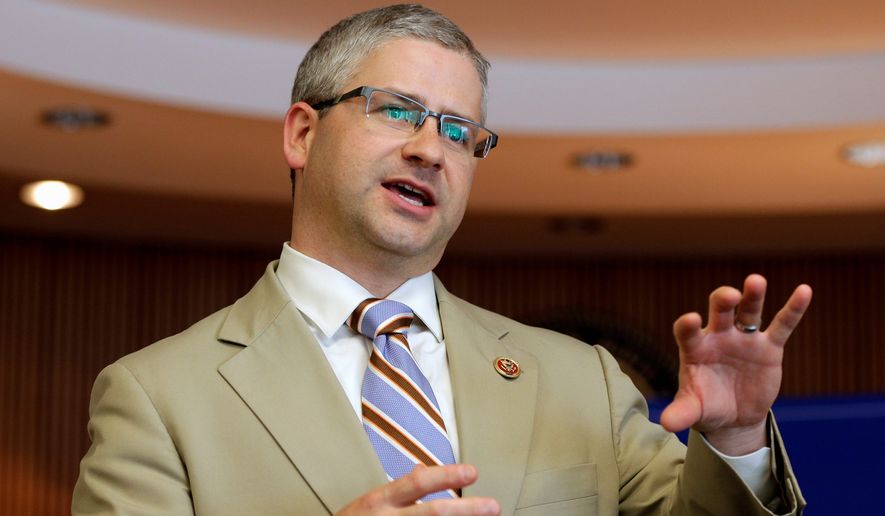Rep. Patrick McHenry, a North Carolina Republican and member of his party’s leadership team, laid down a marker Thursday afternoon, telling conservatives to accept or kill the GOP’s Obamacare repeal bill.
Hours later Rep. Mark Meadows, a fellow North Carolina Republican, shot the plan down, saying it still wasn’t good enough to satisfy conservatives.
It was the latest reminder of how much the fate of the Obamacare repeal rests in the hands of North Carolinians.
In one corner is Mr. Meadows, from state’s west end, who in his role as chairman of the ultra-conservative House Freedom Caucus has become the face of Republican resistance. In another corner is Mr. McHenry, whose district is just east of Mr. Meadows, and who, as the GOP’s chief deputy whip, is one of the House leaders charged with wrangling support for the deal.
Then there’s Mark Walker, from the Greensboro area, who is chairman of the more traditionally conservative Republican Study Committee. He was against the bill before he was for it, saying President Trump won him over this week with some key changes.
As Republicans returned to the drawing board Thursday, North Carolina politicos were left to marvel at their outsized influence.
“North Carolina can make or break anything, that is why they call us the battleground state,” said Ada Fisher, a member of the Republican National Committee from North Carolina and bill opponent. “My term for North Carolina is a bellwether state — as North Carolina goes, so goes the nation.”
The state has 13 members of Congress, 10 of them Republicans, or just 4.2 percent of the whole GOP conference. But they’ve managed to grab a number of the key posts in the majority.
Democrats attribute the split to a bipartisan recognition that the bill won’t do what Mr. Trump promised: Reduce costs and preserve access to insurance.
“The divisions sort of speak to the challenges Republicans have in moving forward on this piece of legislation or any piece of legislation — including on something they have been talking about for seven years,” said Mike Gwin, spokesman for the North Carolina Democratic Party.
Mr. Trump carried North Carolina last year on his way to winning the White House. Republicans there also defended all 10 of their seats in the House and voters sent incumbent Richard Burr back to the Senate for another six-year term — helping preserve GOP majorities in both chambers of Congress.
But Republican unity has frayed during the Obamacare debate, and nerves were particularly raw Thursday after GOP leaders postponed a vote on their bill after Mr. Meadows said he and his troops couldn’t support it.
“We have not gotten enough of our members to get to yes at this point under what we are currently considering,” Mr. Meadows said. “However, I would say progress is being made, and that progress that is being made really should be applauded with the efforts of the White House too try to not only deliver on a campaign promise, but to deliver lower premiums for every American from coast to coast and in between.”
Analysts said the dissonance isn’t surprising.
“Governing particularly under a unified government does not mean party unity,” said J. Michael Bitzer, professor of political science at Catawba College in North Carolina. “Look back when Dems were passing the [Affordable Care Act]. They had to be cutting deals with folks like Sen. Ben Nelson, who was much more conservative than Nancy Pelosi, but all within the same party.”
Mr. McHenry and Rep. Richard Hudson, a top Ryan ally in the House caucus, have been among the most consistent supporters of the bill, while Mr. Meadows and Rep. Walter Jones, another North Carolina Republican, have been among the most consistent opponents.
Mr. Walker, meanwhile, switched to a “yes” after House GOP leaders tweaked the proposal this week to restrict the ability of states from going forward with Medicaid expansion under Obamacare.
Sen. Thom Tillis of North Carolina said he considers every lawmaker in the delegation a friend, and said he appreciates that some of them might have reservations about the bill.
“But we have to recognize that this bill lays the predicate for all the other reform work we have to do, and without it, in my opinion, it is an affirmative vote for the Affordable Care Act, and I am pretty sure in North Carolina that is not what they elected us to do,” Mr. Tillis said.
Mr. Tillis also dismissed the idea that the messy situation is anything out of the ordinary or going to ruin friendships, saying he grew to love the hardball politics and back-and-forth of legislating during his time as Speaker of the House in North Carolina.
“I love it,” he said. “I grew up in trailer park, I like a good scrap.”
• Seth McLaughlin can be reached at smclaughlin@washingtontimes.com.




Please read our comment policy before commenting.